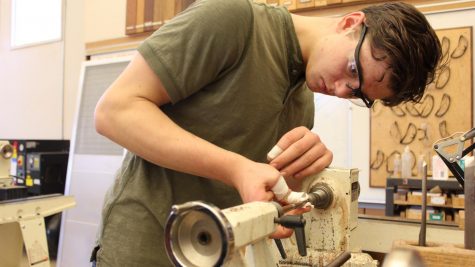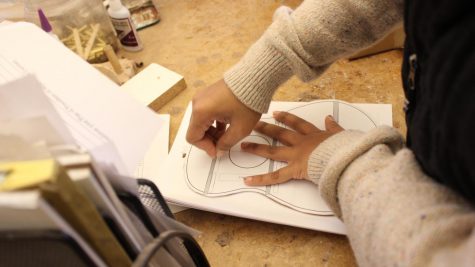Getting back to work
Woodshop’s second semester brings on more projects for students
January 19, 2019
The deafening thuds of wood clashing, drills grinding and the light chattering of the students during first period Woodshop all ceased for the two weeks of winter break. Now that the second semester has begun, new projects begin and the familiar noises rise once again.
Woodshop is structured to fit into a single period of mostly independent work. Woodshop teacher Ted Shinta, along with volunteers and retired engineers Phil Roybal and Howard Cohen, mentor the beginner and advanced Woodshop students. The class curriculum is structured so that there are only a few mandatory projects introduced each semester, leaving room for the students to explore different tools and projects.
Shinta believes his few mandatory projects will introduce all the fundamental tools the students will learn to use throughout the year. At the beginning of the first semester, Shinta introduced pen crafting and a wine holder in a shape of a fish, which gets the students to use the lathe, one of the most commonly used tools in the class. Shinta and his volunteers, who come to support the class on block days, have waited until the second semester to demonstrate how to make more difficult projects such as cutting boards, boxes, ukuleles and bowls. Shinta decided to start with smaller projects, which he says are safer, before letting them explore more advanced woodwork that requires larger tools.

“The students should have completed in the first semester their fish wine bottle holder, which if they’ve done it, they have become familiar with how to use all the different big power tools and smaller ones,” Shinta said. “The fish basically is to get them to use each tool, and each of the large power tools in the shop one or more times under supervision. Then the next project this semester is the cutting board or what we call the edge joining process.’’
Once the students are familiar with and trained in each tool from the first semester, they can start more advanced projects like ukuleles and penny boards. When using power tools though, an experienced peer with a year of class experience is required to supervise and help with the use of the tool.
Some of Shinta’s students from other classes who are interested in woodworking but aren’t taking the class are allowed to come in during tutorials. Senior Manasa Ganesh is an Engineering student of Shinta’s and hasn’t been able to take Woodshop the past few years as she never had space in her schedule. Not wanting to pay for a ukulele, she asked Shinta if she could use Woodshop’s supplies and make one herself. To compromise with Shinta’s worries about her safety, she was required to make a pen first, similar to the beginning woodshop students, before she could proceed to any other project.

“I worked on a pen first semester because I just walked in and asked to make [a ukulele], but [Mr. Shinta] said I needed some kind of experience before I start making one,” Ganesh said. “I’m in Engineering and I took Engineering last year. [Shinta] was the teacher for both and he knows me. I’m a senior so I can’t even take woodshop next year if I wanted to … After I finish this, I’m thinking of making a frame for my pictures.”

















